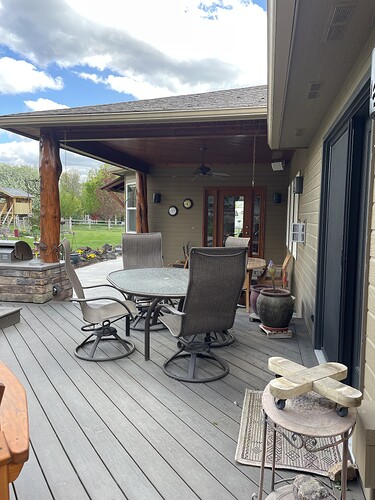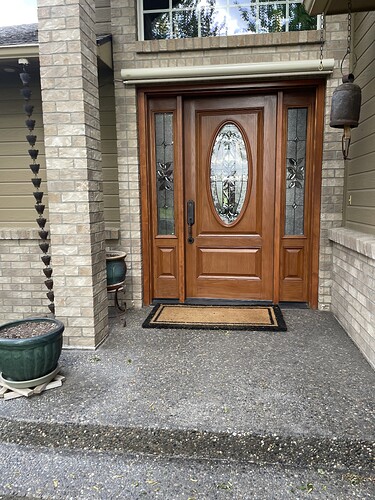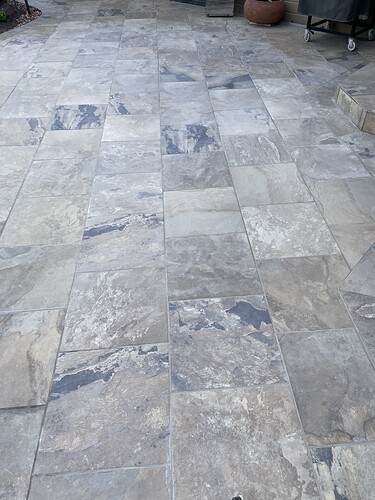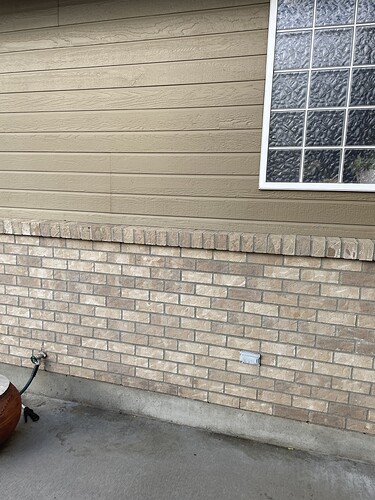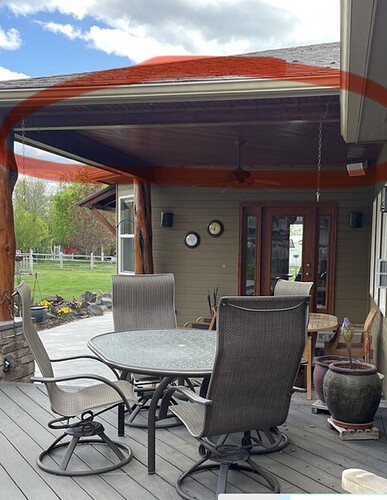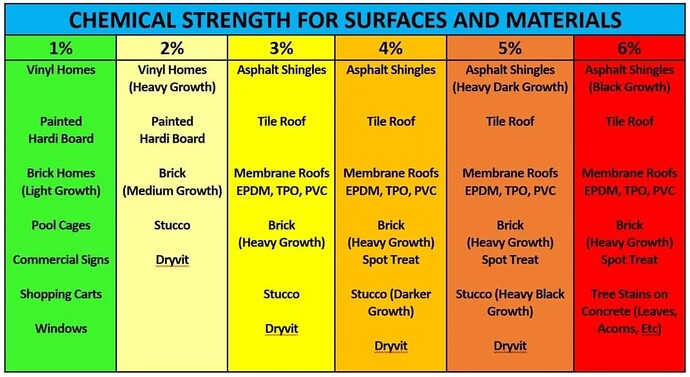I have another house wash job coming up and I hope my mix solution issues (in last post) get resolved so I don’t feel like it being another dud job. But I will be spraying around these materials and need to know if I should do something specific to make sure I don’t ruin them. There’s stained wood, stained wood trim around doors, brand new stone tile and grout on a pathway outside (just done about a week ago). Also, is there anything different I should do with the brick other than the normal coverage that the siding gets?
Pictures below
I’m going to sound like an asterisk here, but what are the materials there? Did you identify them prior to taking the job? If not, you lied to the customer, you made an agreement with them to do a job that you don’t know how to do. I’m just saying experiment on your own home and not a customers. A little bit of reading will help you a lot. We get a lot of people that come on here and want spoon fed every thing, they don’t learn anything. Read more here and experiment at home. I don’t even start the year until I test my rig out on my house and concrete.
I count at least 6 different items, not counting vegetation and glass. I’d say more but I gotta leave, helping the pool guys out and they start late due to cold temps in am.

This needs to say at least 2 hours, not 19 minutes. You can easily find all the answers to your questions and much more. One thing I’ll say, don’t let a drip of bleach touch any of that stained wood.
You’re going to have to do a lot of wetting everything down before you start. And keep it rinsed throughout the job. You picked a doozy for one of your first jobs. A few things could go wrong.
The wood ceiling would make me nervous because it never sees a drop of water and you don’t know what product they used. So water drop marks are a real possibility. My goal would be to keep that wood dry unless they’re wanting you to prep it for staining.
My guts clench just looking at that pristine door and door handles.
Agreed. Ponds and stained wood. ![]()
So I won’t get into the debate here but I didn’t lie to them….I can get it done whether it’s the old conventional way of wash, scrub rinse, or if it’s the softwash method that everyone seems to say is super quick and easy and yet I haven’t had that same experience…so I’m looking as to what I need to be able to get there! Plus it’s pretty hard to test on my own place when I don’t have the things they do to test on! And just so you’re aware….I have done a lot of research and unfortunately it isn’t the easiest to find the information for every little specific thing. Which is why I’m here asking for peoples experience because I prefer to figure things out myself but I just can’t find the info. If you’d like to actually give advice and maybe send me some links that would be really helpful! Other than that I don’t really care to waste my time reading negative assumptions. Thank you though for your time
I don’t plan to spray that wood ceiling at all. They just want siding and such so that’ll be safe but I’m also glad you covered the idea of keeping all the wood dry. Would you be concerned about the stained pillars too? They’re well stained and sealed I just don’t know what she solution could do to a stain like that
What’s the biggest concern with them? Would it just need to be pre-wet and then washed down again right after spraying?
What does the bleach do to the stained wood? I’ve read that sealed/stained wood doesn’t get effected but I’m guessing that info was wrong now lol
As long as you pre-wet and don’t let your solution dry on it, it should be fine.
That front door looks like fake wood but if it’s real, I’d consider taping it off. At a minimum it’d be the last area I sprayed and I’d immediately switch to water and rinse it.
My weather is trash, its pouring out again today, so I have time to give you a more complete response.
Since you didn’t paste your relevant work experience and equipment…I have to make assumptions based on the information provided (limited as it was). I was forced to use deductive reasoning.
I am more than willing to help people on here, just as I was helped on this forum. When I came on this forum I was told what I am telling you…read more, experiment at your own house, and don’t take a job you can’t do. You posed a interesting point: How do I practice on something I don’t own? Easy, find someplace that has it and do it for free to learn (be clear about it and set expectations), friends, family, homes getting demolished, junk yard. Alternatively you can build it in your yard, get two wood pallets and stain one and paint the other and test away with SH, strippers, acids, degreasers. Go to lowes/hd and buy 2-3 similar tiles and test ($12-$20 investment max), Buy some pavers or get some from craigslist that someone is giving away and test degreasers (put oil, tar, fresh leaves and then see what happens).
I’m telling you what I was told, and this is contractor gold in this business…always test in an inconspicuous area. You should test each surface. Once you have more experience under your belt you can start making some calls, until then test. Even after you have some experience still test. You should have a sample kit of stuff to test in your bucket, SH, degreaser, acids, etc. What you use each product on and how you apply, dwell, and rinse is another matter. You had a ton of different materials on one job. Learn how to identify materials, then come on here and some questions about those products or use the search bar. Unless it is some new material it has been covered here. I promise you that you will learn a lot more that way and will be able to make better decisions going forward. It is like the parable about giving a man a fish or teaching him to fish.
Those pictures are deceiving, whether an item is wood or plastic, whether it is a facade or solid brick, if it is vinyl or Hardie, trex or PVC, slate tile or some stamping or some other tile. I see what might be a built in cooking center on the edge of that deck, what is it and how to you plan on protecting it? Painter’s plastic is cheap insurance, 5 minutes with a clean rag will save $$.
I do research and tests on just about every job, I wouldn’t tell you to do something that I wouldn’t. Every single deck I do gets tested with chems, a sander, an osborn brush before I do the deck. 2 years ago I ran into steel siding that I had never seen before, I did multiple tests and then came here and asked questions.
I understand where you’re coming from but there’s still no need for judgement without even inquiring for the information. I haven’t mentioned my specific experience no but I have said that I’m new to this and am trying to get handle on it all. Secondly my setup is DIY at best batch mixing at the moment. But again that doesn’t matter because I’m asking for specific advice on equipment and chemicals. I’m willing to get what I need but I can’t just go and buy everything now and just go for it all. I’m getting things I need as I can get them. I don’t have an automatic income coming in that I’m working with. So I get things as I need them which is also why I’m trying to research as much as I can so I can’t avoid wasting my money on chem, material, and equipment that isn’t recommended and can’t really just buy all sorts of stuff to just test on and stuff. I wish I could but I can’t do it all at one time. And my time available isn’t the best! Even if I have to just say screw it and go the old fashioned route with a brush and a hose to get a place clean, I will because I need to build and it takes money to build.
I definitely plan to test everything I can but I run into issues of not being able to test with commercial sh because I don’t have a dealer close by and can’t throw away $100 on sh that I don’t have a job scheduled to use the rest on. I’ve been working with Walmart pool shock at 10% sh and I’ve had no success cleaning the way every video I’ve watched suggests it should go and I think it’s because I’m dealing with fallout over here on almost every house and every siding. I really need a solid list of chemicals for each material, type of situation, and a place to get them.
I know what most the materials are there’s just a ton of different back and forth info on what to do with them. The brick on the house isn’t full brick but those panels that just attach to studs and get mortared in the gaps. But why wouldn’t those have the same approach as regular brick since it’s the same stone, same material? Wouldn’t I just prewet them, sh them, dwell for a few minutes, and rinse? The cooking area itself I would move the bbq if I can, if not I would plastic it and wet rag wipe it down after to just clean it up as a bonus and otherwise keep all the stone wet the entire time in on that side.
They also want me to clean the composite boards in the deck around the hot tub which from what I’ve read shouldn’t have a negative reaction with sh but what’s your take? The material on the house isn’t hardy, it’s a wood lap siding but not solid wood….more like that press board material ■■■■ they use these days. I know what the materials are as I do contracting work too….I just don’t know what every single one of these materials requires as far as chem solution (safe, not safe) and the approach to take. Being prior military I’m wanting to know every piece of info, every answer I possibly can so that I can come up with the best possible situation/approach for success!
Thank you for your time and feel free to message me anytime. The more I can learn and actually get answers towards the success the better!
I just realized what you meant. I don’t only read for 19min. I’ve only read that much while being a member! I’ve put in many hours of reading on this forum. I only decided to become a member a couple days ago so that I could post in here.
This statement doesn’t compute in my head… you don’t have a ton of time available, but you’re willing to scrub everything by hand if need be?
Regardless, based on what you have said in this thread, I would say tuck your tail and pass on this job… stick to vinyl and make some easy money. You don’t need to buy “commercial SH” from a dealer… you mention Walmart, if you have a Menards nearby go grab a couple gallons of Pool Shock or go to a pool store and buy liquid chlorine, it’s 12.5% and sold by the gallon. Read a ton on this site… soak it all in. You may not think it is, but everything you have said has been covered before.
Just a small sample of what a couple minutes of searching this forum brings up, these answer most of your questions and at the bottom of each thread are related ones as well to expand on.
Chem test kit
Wood Ceiling
Composite Decks
Brick
Travertine pavers? Thats what the photo looks like, but I’m not sure
Nice Wood Front Door Damage
Deck Cleaning, but Really Any Wood
Removing Fallout
If you can’t kill organic material with your mix, then your math is wrong
What I meant was that my time available is short. Between other jobs I’m working, coaching K-2 flag football, being on the board for the youth football league, my freemason meetings, dealing with kiddos, fighting fires, etc….my time to not be making money and to not be working on building this business is very thin. I would love to have a few days to waste and money to waste on random materials and chemicals to try every little possibility with. But that’s why I’m here on this forum and doing as much research as I can so that I don’t have to go through the waste of money and time because you guys have already gotten the answers and if I was the first one or even one of the first ones I would gladly share all my info with you all to help you out too……but unfortunately I’m the one trying to get advice and learn from you guys. I just keep getting different answers about stuff
I didn’t pass on the job. I’m doing it the hard way because I need it. I don’t have the luxury of letting opportunities go right now.
Thank you for all the links. I know the answers are on here but there’s a ton of conflicting information from one person to the next that I just wish there was a chart of each chemical and what it’s for and how to mix/use it on each material it’s good on and what to keep it off of. There’s no charts anywhere with simple to read info and it sucks lol
Start with this chart for SH. Other chemicals you’re gonna have to search for on your own based on what you’re trying to do. The reason you are finding “contradictory’s” is because multiple factors impact the effectiveness of chems to clean. So what chem/ratio works for one person might not work for others. Plus everyone has an opinion on what they prefer. If you’re researching a thread about cleaning wood, and the majority say use less then 1200 psi, but one person says blast away at 3000 psi… probably don’t listen to the one person going against the majority. A lot of it is going to be trial and error… that’s why wasting some time and money in the beginning to research and figure out what works for you is going to be worth it in the long run. When you run into a problem, find 3 threads related to the issue on here and see what you can learn from them… still not solved? Then create a thread asking a detailed question with as much info as you can provide… you will receive far more helpful responses if people can see you’ve tried to figure it out beforehand. Everyone on this forum has started where you are, and those that have spent the time contributing, reading, and have hung around a while have been successful. You can do it too, just give it time.
F9 - Go to apple or google for the mobile version.
What we’re telling you is that job can potentially be very damaged and we are trying to protect you AND the customer. There have been numerous stories of damage that require thousands of $$$ to fix.
don’t make a science project out of it
